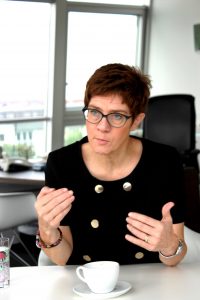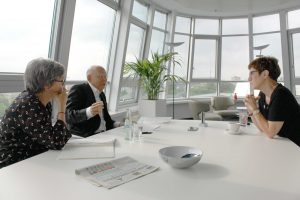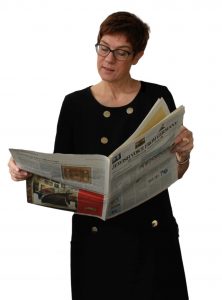Germany stands for Israel’s right to exist like no other country, says CDU General Secretary, Annegret Kramp-Karrenbauer, in our exclusive interview…

(c) JVG
We are witnesses to a time in which the world order is being transformed and in which international relations have lost some measure of stability. How will the CDU and the German government respond?
In terms of foreign policy, we are confronted with a U.S. president who is asserting his country’s national interests. This means we must defend our own interests with vigor. Where we can identify points of weakness, we must eliminate them. It is also evident that our position is stronger as part of a unified European response. This is why we must promote European unity. Domestically, we must ensure that anti-American sentiments do not gain force, irrespective of the tone emanating from the White House. We must make clear that we continue to value our transatlantic friendship. And we must make clear that this friendship is too strong and multifaceted to be threatened or undermined by the actions of a single U.S. president.
How can we prepare German society for the fact that defense spending will need to be increased?
To begin with, we must raise awareness regarding the fact that the traditional division between domestic and foreign policy no longer holds true. Everything that happens elsewhere – for example, in Syria – has a direct impact on Europe and on Germany. The second point is that Germany must overcome its restraint in terms of foreign policy – this includes our defense policy and our alliance policy as well. Our partners rightly expect us to assume greater responsibility in these areas. And assuming a greater share of responsibility will also mean increasing spending.
The AfD won 27% of the vote in Saxony. Are we running out of time to counter their radical slogans and simplistic answers?
We need to engage with this issue and wage this battle every single day. That means providing evidence that what the populists are claiming simply isn’t true. And we must be very clear and unequivocal in our political engagement. For me, this means the CDU must be very forthright in pointing out what the AfD is all about, and what elements it is harboring. Those include radical elements on the far right that are anti-Semitic, that support historical revisionism, and that are racist. We must ensure that no one will ever be able to claim they did not realize this part of what the AfD is about.
Because of the fundamentalist-Islamic threat that became apparent in this country after 2015, Germany has suddenly begun to reflect on its Judeo-Christian tradition, which has in fact shaped this country for 1,700 years…
Because of the people who have arrived in our country since 2015, and also prior to that, we have gained a public awareness that these are people who come from a very different cultural background, tradition, and faith. This has compelled us to reflect. It is like a mirror. We can see the others in that mirror, but we also see a reflection of ourselves. The question then arises: if that’s who they are, then who are we? We are being asked to define who we are. When it comes to integrating newcomers and to living together in our community, we have the right to demand that people who come to our country accept our rules and values. But this requires that we ourselves know what our rules and values actually are.
How can we raise awareness about the German-Jewish symbiosis now, 1,700 years on?
In our campaign, “From Shabbat to Shabbat”, the Young Union [the party’s youth organization] had a very nice approach. They established an online site in which they explained the Jewish origins of many terms that we use every day, such as “techtelmechtel” and “guter Rutch.” Many people weren’t aware of the origins of those terms. It was one of those small initiatives that really managed to get people thinking and to learn something new. Our political approach is that we don’t only seek to combat anti-Semitism; we also show Jewish life in Germany as it is today.

(C) JVG
In 2008, Angela Merkel stated in an address before the Knesset that Israel’s security will never be open for negotiation. Seven years later, an agreement was signed with Iran in which Israel’s right to exist, as well as the right of Saudi Arabia and Egypt to exist, was not mentioned. How is this possible? Can such an agreement function as written when one of the contracting partners wants to destroy another country and has announced that intention publicly?
Of course, opinions vary on whether the deal is a good one or not. But overall, I believe that it is better to have a set of rules that acts as a check on such a development and perhaps even prevents it. Angela Merkel said that Israel’s security is part of Germany’s raison d’être. And that raison d’être must be made evident anytime Germany engages in political debates about current political issues in Israel. We must always make clear that there is a very good reason why Germany, in particular, must stand behind Israel’s right to exist. The Iran deal is surely not the most optimal deal in the world, and I believe that improvements are urgently needed. Many people who discuss Israeli politics here in Germany tend to ignore how isolated Israel is in the region, and the threats Israel faces to its existence. We must constantly point out that many of the issues under discussion are existential questions for Israel. This is what makes Israel’s situation decisively different from that of other states.
Under the circumstances, was it wise to cancel the annual German-Israeli government consultation last year in response to Israel’s settlement policy?
My impression is that the new foreign minister is taking a different approach toward Israel, and that is what matters. This approach is now the correct one. The fact that one of Heiko Maas’ first trips abroad as Foreign Minister was to Israel sends a very clear signal.

The U.S. has recognized Jerusalem as the capital of Israel. This has provoked massive resistance, also in Germany. But Jerusalem was already the capital of Judea in biblical times, and has been the capital of Israel for 70 years…
We continue to support a two-state solution. Whether the decision to move the U.S. embassy under the current circumstances is helpful or less than helpful in achieving this goal is a matter of debate. Personally, I would very much like to see Jerusalem, which has always been a very special city for people of many different religions, succeed in embodying its unifying character more strongly than is currently the case. I would very much like to see Jerusalem become a symbol for our ability to coexist and live side by side as people of various faiths. Quite often, this is indeed already the case despite what some newspaper headlines would have us believe.■
Annegret Kramp-Karrenbauer talked to JVG editors Elisabeth Neu and Rafael Seligmann at the CDU headquarters in Berlin
